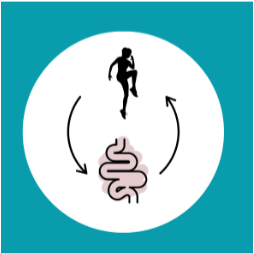Interplay Between Exercise and Gut Health: How to Improve Exercise with a Happy Gut
How to use exercise to build a happy, healthy gut
We are constantly told that to improve our endurance we need to: lift more weight, work out more or have a healthy diet.
However, what if it goes beyond all of this. What if, to improve our endurance, we also need a happy gut?
Gut microbiota and exercise are interconnected, according to recent studies. These studies have highlighted a bidirectional relationship, with exercise impacting our gut health and vice versa.
Keep reading if you’re interested in finding out about this important relationship, understanding the benefits of a happy gut and how probiotics can boost our gut health.
What is our gut microbiome?
Only half of the cells within our body are actually human. The rest of us is made up of microorganisms and it is estimated that over 70% of all microbes in our body are contained within the gut.
"What makes us human is, the combination of our own DNA, plus the DNA of our gut microbes" - Prof Rob Knight
The gut microbiome is a complex and diverse ecosystem with the majority of bacteria from the four phyla: Bacteroides, Firmicutes, Proteobacteria and Actinobacteria.
This ecosystem existing within us can impact our health, mood and even how we respond to medication.
“The gut microbiota is key to many aspects of human health including immune, metabolic, and neurobehavioral traits” - Ana M. Valdez and colleagues
That’s when we realise the importance of taking care of our gut health. A strong and healthy gut microbiome depends on richness and biodiversity.
Interplay between exercise and gut
Recent studies suggest that exercise can enhance the number of beneficial microbial species, enrich the microflora diversity and improve the development of commensal bacteria.
It doesn’t stop there: new research points to the gut microbiota as a key player in your body, especially when it comes to fitness.
A healthy gut gives the ability to digest and absorb nutrients, to produce energy for an athlete.
A study conducted on elite rugby players showed that exercise enriched the diversity of gut microflora. Results indicated that both diet and exercise defined the microbial biodiversity of the gut.
“When your gut is healthy, you have more energy, your hormones function more smoothly, and your body is able to assimilate the nutrients you eat" -Laura London
Source: Ferrocalm
The interplay between gut and exercise: 3 Steps
Step one: The gut microbiome contributes to digestion and promotes food absorption for host energy production.
Step two: Fermentation of gut contents by the microbiome generates metabolites that are highly relevant to athletes, such as short-chain fatty acids (SCFAs).
Step three: SCFAs can be used as an energy source by host cells and the intestinal microbiome, and they also play a role in shaping the gut environment, as well as possessing some anti-inflammatory effects.
Source: Ferrocalm
A healthy gut increases energy levels
Our gut has also been called the “second brain” by many scientists, due to the connections between the brain and the enteric nervous system present in our digestive tract.
In short, the good and bad bacteria in our guts can communicate with our brains and affect our mood and energy levels.
If we have an unhealthy gut, we can send signals to our brain which then affect our mood and energy in a negative way.
This prevents us from having a good workout or means that we avoid exercise- showing the intrinsic link between the two elements for our health and wellbeing.
A healthy gut helps progress with weight loss
Latest research suggests that our gut health is not only a key component of overall health, but also the secret to optimising weight loss.
Two specific microbes are associated with body weight: Akkermansia muciniphila and Christensenella minuta. These bacteria are found in the gut, linked with preventing weight gain and often found in leaner individuals.
These bacteria feed the mucus that lines our gut and promotes its production while strengthening our intestinal barrier.
Frequently, obese people are found to have a weaker gut lining.
Another benefit of these bacteria is the production of acetate, a short chain fatty acid known to help regulate fat stores and control appetite.
Interestingly, Akkermansia muciniphila has been shown to reverse weight gain from a high fat diet and insulin resistance in mice.
So, jogging, swimming, and cycling increase the wealth of good bacteria that can support our gut barrier function, prevent inflammation and may even support weight loss.
Using probiotics to improve the gut
Probiotics are defined as live bacteria and yeasts which have a beneficial health effect.
Specific probiotic strains can improve the integrity of the gut barrier in athletes.
Additionally, selected anti-inflammatory probiotic strains have been linked to improved recovery from muscle-damaging exercise.
More specifically, it was found that S. thermophilus can increase run time to fatigue in the heat.
However, probiotics and prebiotics are less effective during periods of stress.
Stress can affect our bodies, especially our guts. Why? Well, one reason is that stress causes our bodies to release noradrenaline. Noradrenaline in turn releases iron into the body.
Unfriendly bacteria can use iron as a nutrient to multiply. On the other hand, most friendly bacteria - including the ones present in many conventional probiotics - can’t do this.
Too much iron in the wrong place means that friendly bacteria get outnumbered, leading to a very unhappy gut.
With an estimated 20% to 60% of athletes suffering from stress caused by excessive exercise and inadequate recovery, could this impact on gut health be affecting your performance?
Would you like to improve your gut health and fitness level?
At Ferrocalm, a team of expert gut scientists have created a food supplement using friendly live bacteria that can thrive even during a period of stress when there’s excess iron in the body.
Use the link to find out more about Ferrocalm: www.ferrocalm.com

